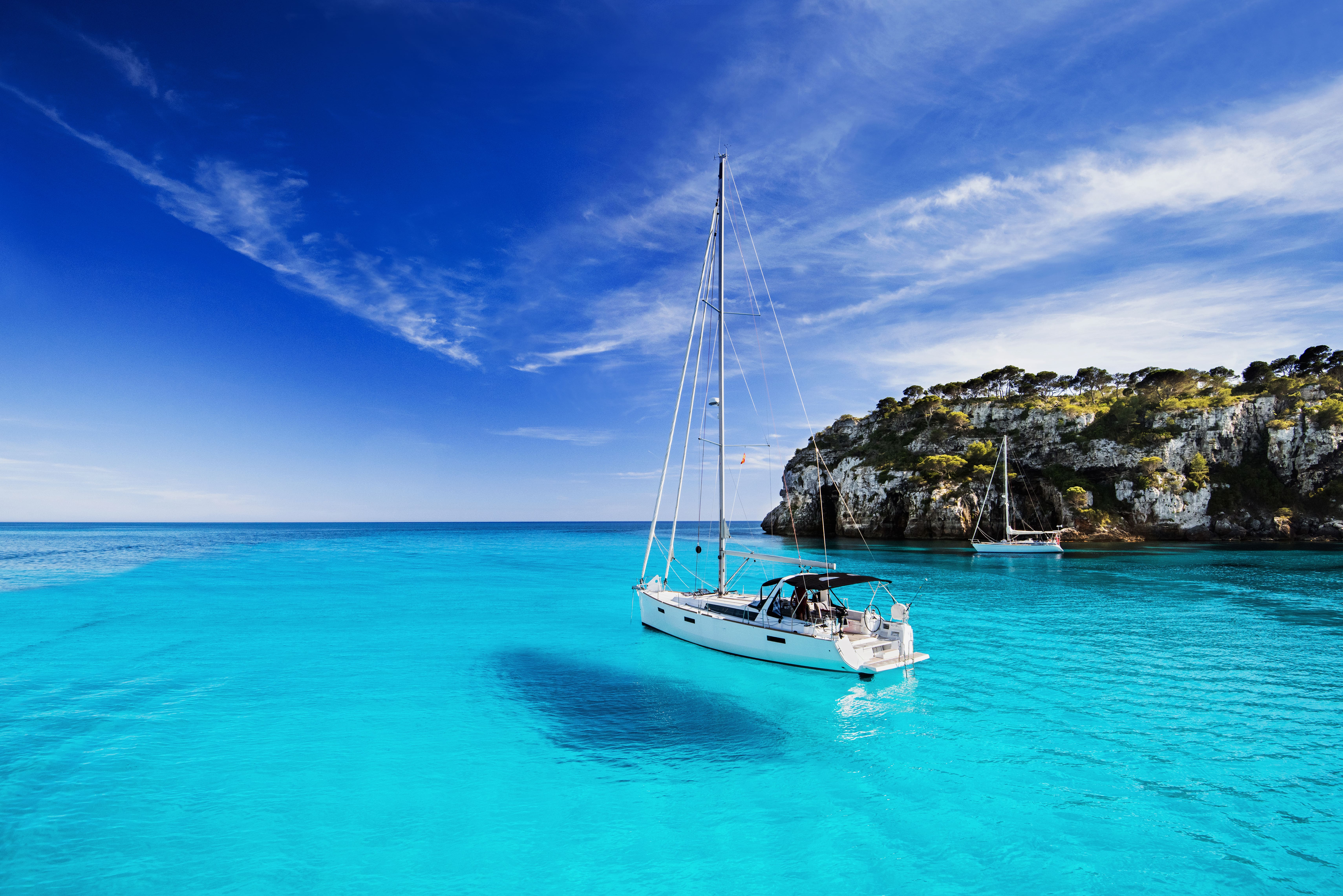Everything you need to sail to another country
22 August 2025

One of the most thrilling aspects of owning a boat is the potential to explore the globe. Setting sail and traversing the open seas to reach new and exciting countries. When you have access to a boat and a little sailing experience, the world really is your oyster.
Before you go sailing off into the sunset, it’s important to consider what you’ll need to take with you when visiting another country. You’ll also need to consider any rules and regulations that might be different depending on the region and ensure you follow all laws so you don’t face any issues when you’re on the water.
In this guide, we look at the essential things you need to know when sailing overseas.
Essential paperwork to have on board when sailing overseas

If you’re sailing a UK-registered boat from the UK to another country, you need papers for the boat (ship’s papers) and for the crew on board (personal papers).
The following documentation is essential:
Ship's papers
- Registration document
- Ship Radio Licence
- Insurance documents
- Evidence of eligibility for relief from VAT and import duty
- Voyage log
Personal papers
- Evidence of Competence
- Authority to Operate Maritime Radio
- Passport or other recognised travel document and visa if applicable
- GHIC (or EHIC) and insurance cover for medical care abroad and repatriation to the UK
Ship’s Papers
Your ship’s papers consist of the core paperwork relating to your vessel and the skipper or crew that you need to be able to present to a customs official if required. Ideally, all documents should be the original copies.
Essential documentation for the boat itself includes:
Registration document
If you wish to take your boat outside of territorial waters, you need to have the registration document. Registration documents aren’t compulsory for boats in UK waters, but as soon as you take it out of UK waters, you will need one. Many countries, like France, require you to have the original document and not a photocopy. In the UK, the UK Ship Register now issues Part III (SSR) Registration Certificates digitally. The digital certificate contains a QR code that foreign ports are able to scan. There shouldn’t be any problems with using this system overseas.
Radio Licence
Under International Radio Regulations, all transmitting stations must have a radio licence.
If you have radio equipment installed or used on your boat, a UK-registered vessel must have a Ship Radio Licence, issued by OFCOM. This details the equipment covered by the licence, and you must carry it on board your boat when sailing. On your radio licence, you’ll be provided with an International Call Sign and a Maritime Mobile Service Identity (MMSI) number for the vessel (if applicable).
The equipment must also be operated or supervised by someone who has a maritime radio operator certificate.
Insurance
In general, insurance is now compulsory in many European countries, and many will ask for proof of cover. Some countries stipulate specific conditions. In Portugal, for example, third-party liability insurance is required for any vessel over 7 metres in length.
Often, you’ll be required to have a translation of your insurance documents. Speak to your insurer before you travel, and they should be able to provide you with one. It’s therefore important to have a full plan of all the countries you want to visit on your trip well in advance and research the specific requirements for the country you plan to travel to.
Proof of VAT status
This is more for your return to the UK. You’ll rarely be asked to provide this, but you may need to prove that your boat is eligible for relief from VAT and import duty – basically, that you don’t need to pay tax to import your boat back to the UK.
For a short trip abroad, you’ll likely need to be able to prove that:
- The boat had UK domestic status when it left the UK, and that VAT was paid
- The boat is being imported by the same person who exported it
- The boat is returning to the UK within 3 years of being exported
- The boat has undergone no more than running repairs that didn’t increase its value while outside the UK
Voyage log
Again, not completely compulsory, however, it’s good practice to keep a log of all your voyages, and sometimes foreign officials have been known to ask to see them.
Personal papers to have to sail to another country

International certificate of competence (ICC)
Depending on the size of a boat and its use, the skipper may or may not need a certificate of competence or a licence.
In the UK, a skipper doesn’t need a certificate of competence if:
- The UK boat is a pleasure vessel – used for the sport/pleasure of the owner and is not operating commercially or carrying more than 12 passengers
- It is either less than 24m in load line length or less than 80GT
But the rules vary from country to country, so it’s important to check what you need in advance.
Though not always needed, it’s good practice to carry this just in case. The ICC helps overcome the difficulties that can arise between different regions and discrepancies in legislation. The ICC provides an assurance from one government to another that the certificate holder has demonstrated the necessary level of competence to drive the vessel.
Passport, visa, GHIC
The skipper and every member of the crew also need the following documentation:
- Passport: It’s advisable to check the expiry date well in advance of any trips you plan to make in case you need to apply for a renewal.
- Visa: A visa is not always necessary, and some countries provide different options for short and long stay durations. For example, British Citizens can travel visa-free to the Schengen Area as a tourist for up to 90 days in any 180-day period.
- Global Health Insurance Card (GHIC): For further information on GHIC – or to see if you’re still eligible for the European Health Insurance Card (EHIC) under the Withdrawal Agreement – please refer to the NHS website. It’s worth noting that neither of the cards should replace travel insurance.
Other things to consider when sailing into foreign waters
As well as the essential documentation for the boat, skipper and crew, it’s important to consider the following when sailing to another country.
As well as the essential documentation for the boat, skipper and crew, it’s important to consider the following when sailing to another country.
Flag etiquette when sailing abroad from the UK
What is an ensign?
An ensign is the national flag of your country of origin, to indicate your nationality to other vessels. It needs to be flown as close to the stern as possible and is to be worn at all times in daylight. Be aware that the maritime ensign is not always the same as the national flag. The UK maritime ensign, for example, is different.
When sailing abroad from the UK, it's important to display the correct maritime ensign to indicate your vessel’s nationality—and sometimes your yacht club affiliation.
What flag should you consider using on your yacht?
Most privately owned, UK-registered pleasure boats fly the Red Ensign, which is the standard and doesn’t require any special permissions. It’s widely recognised as the red flag with a Union Jack in the upper-left corner and is suitable for most recreational vessels.
If you're a member of a recognised Royal Yacht Club, you may be eligible to fly a Blue Ensign or a Defaced Blue Ensign (which includes a club or regional badge). However, this requires an Admiralty Warrant, so be sure to check your eligibility and obtain the proper documentation.
The White Ensign is reserved strictly for the Royal Navy and vessels of the Royal Yacht Squadron with special approval. It’s not permitted for general use.
While the Union Jack isn’t used as an ensign, it may be flown at the bow when moored—typically by authorised or military vessels.
When to use Q flags
As you travel into international waters, a Q flag symbolises that you have not officially ‘checked in’ to the country you’re visiting. Customs and immigration control should then come to inspect your boat; however, check the individual guidelines for the specific port you’re planning to visit.
It is also customary to fly a courtesy flag of the country you are visiting, although not obligatory. Fly it from the starboard spreaders used for signalling and make sure it’s in good condition, as some nations see it as rude to hoist a tatty flag!
Other general yacht flag rules:
- Only one ensign should be flown at a time.
- It should be appropriately sized for your boat.
- Traditionally, ensigns are raised at sunrise and lowered at sunset.
Flying the correct ensign not only shows respect for maritime tradition but it can also help smooth sailing when entering foreign waters.
When a boat registration may be needed
In the UK, whether you need to register your boat depends on where and how you use it. For private pleasure craft at sea, registration is optional but strongly recommended if you plan to travel abroad, operate a VHF radio, or fly a UK ensign. These vessels can be registered under Part I of the UK Ship Register or the Small Ships Register (SSR).
For inland waterways — such as canals, rivers, and lakes — registration is mandatory with the relevant navigation authority, such as the Canal & River Trust or the Environment Agency. You’ll typically need a valid Boat Safety Scheme (BSS) certificate and valid insurance to obtain a licence. Registrations usually need to be renewed annually, and failure to comply can result in fines or removal of your boat.
Country-specific documentation and publications
Some countries require you to carry a list of everyone who’s on board your vessel, whilst many also specify that you need to carry a copy of the local almanac and guidelines for the area you are visiting. Another common publication that’s recommended is the International Regulations for Preventing Collisions at Sea.
Red diesel receipts
Although legal to purchase in the UK, it is now illegal in many EU countries, for example, Belgium. Just in case you’re asked, keep hold of your receipts for your fuel purchases along with your engine hours so that you can prove the legitimacy of your red diesel purchase.
Travel insurance
You should always purchase travel insurance whenever you go abroad, regardless of the mode of transport, to make sure you’re covered should anything go awry. There are plenty of options to suit different budgets and lengths of stay, including year-long cover, should you travel frequently for a lower premium.
What laws do you need to follow while in international waters?

The United Nations Convention on the Law of the Sea (UNCLOS) provides a framework for the law when out at sea. It defines territorial limits which determine which country a vessel is under the obligation of. Generally, follow the rules of your home nation, but be aware that as you enter different areas and potentially go ashore, customs may be slightly different. From dress codes to mannerisms, general etiquette might vary, so learn as much as you can about the area you’re visiting before you go.
To help make your trip as safe, legal and enjoyable as possible, the best advice we can give before you sail the international waters is to do your research well in advance – find out where the local ports and customs offices are, what the entrance requirements are, and learn a little of the local language.
Ultimately, you are responsible for making sure that you have all the necessary documentation for stress-free sailing abroad. If in any doubt, get in touch with your local boating authorities for further advice. And be sure to keep all your documents in a waterproof case!
Specialist sailing yacht insurance through GJW Direct
Wherever you decide to take your sailing yacht, you may want to consider sailing yacht insurance to protect both you and your boat. Specialist yacht and sailing boat insurance through GJW Direct can help provide financial protection should the worst happen.
Get a quote today to see how much your cover could cost.
Please note the information provided on this page should not be taken as advice and has been written as a matter of opinion. For more on insurance cover and policy wording, see our homepage.
Got a question? Call our UK call centre 0151 473 8000
©Copyright Ripe Thinking Limited 2026. GJWDirect® is a registered trademark and a trading name of Ripe Insurance Services Limited which is Authorised and Regulated by the Financial Conduct Authority No.313411.
Registered office: One Stockport Exchange, Railway Road, Stockport, United Kingdom, SK1 3SW. Registered in England No. 04507332.
